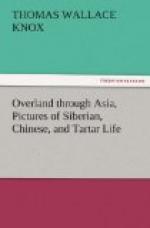The Chinese merchants are frequently called scoundrels from their habit of overreaching when opportunity occurs. In some respects they are worse and in others better than the same class of men in Western nations. The practice of asking much more than they expect to receive prevails throughout their empire, and official peculation confined in certain limits is considered entirely consistent with honesty. Their cheating, if it can be called by that name, is conducted on certain established principles. A Chinese will ‘beat about the bush,’ and try every plan to circumvent the man with whom he deals, but when he once makes a bargain he adheres to it unflinchingly. Among the merchants I was told that a word is as good as a bond. Their slipperiness is confined to preliminaries.
China contains good and bad like other countries, but in some things its merchants rank higher than outside barbarians. When the English were at war with the Viceroy of Canton, the foreigners were driven out and compelled to leave much property with Chinese merchants. These Chinese never thought of repudiation, but on the contrary made their way to Hong Kong during the blockade of the Canton river for the purpose of settling with the foreigners.
Old John Bell of Antermony, who traveled to Pekin in the reign of Peter the Great, in the suite of a Russian Ambassador, makes the following observations on the Chinese:
“They are honest, and observe the strictest honor and justice in their dealings. It must, however, be acknowledged that not a few of them are much addicted to knavery and well skilled in the art of cheating. They have, indeed, found many Europeans as great proficients in that art as themselves.”
In the shops at Maimaichin there is no display of goods, articles being kept in closets, drawers, show-cases, and on shelves, whence they are taken when called for. This arrangement suggests the propriety of the New York notice: “If you don’t see what you want, ask for it.” Many things are kept in warerooms in other parts of the building, and brought when demanded or the merchant thinks he can effect a sale. In this way they showed me Thibet sheep skins, intended for lining dressing-gowns, and of the most luxurious softness. There were silks and other goods in the piece, but the asking prices were very high. I bought a few small articles, but was disappointed when I sought a respectable assortment of knick-knacks.
One of the merchants admired my watch and asked through my Russian friend how much it cost. I was about to say in Russian, ’two hundred roubles,’ when my friend checked me.
“Dites un enorme prix; deux mille roubles au moins”
Accordingly I fixed the price at two thousand roubles. Probably the Chinaman learned the real value of the watch from this exaggerated figure better than if I had spoken as I first intended.




